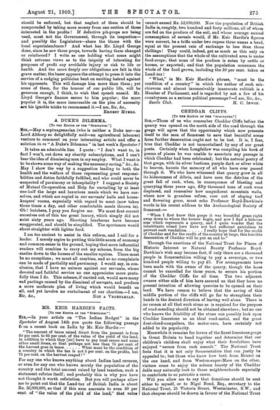MR. KEIR HARDIE'S FACTS.
[To THE EDITOR Or THE " SPECT•TOR."] your article on "The Indian Budget" in the Spectator of August 14th you quote the following passage un a recent book on India by Mr. Keir Hardie :— "The amount of taxes raised direct from the peasant is from -50 per cont. to 65 per cent. of the value of the yield of the land, in addition to which they [sic] have to pay local ceases and some other small items, so that perhaps not less than 75 per cent. of the harvest goes in taxes What must be the condition of -a country in which the tax is not 5 per cent. on the profits, but 75 per cent, on the harvest reaped ?"
For any one who knows anything about Indian land revenue, or even for any one who knows merely the population of the country and the total amount raised by land taxation, such a statement refutes itself ; and probably this is why you have not thought it worth refutation. But you will perhaps allow me to point out that the Land-tax of British India is about Rx. 26,000,000, so that if this sum amounts to even 50 per -cent. of "the value of the yield of the land," that value
cannot exceed Rs. 52,000,000. Now the population of British India is, roughly, two hundred and forty millions, all of whom are fed on the produce of the soil, and whose average annual consumption of cereals would, if Mr. Keir Hardie's figures were correct, be a trifle under two rupees three annas a head, equal at the present rate of exchange to less than three shillings! They could, indeed, get as much as this only on the assumptions that the whole of the cultivated area is under food-crops; that none of the produce is eaten by cattle or horses, or exported; and that the population consumes the whole of the food grown, including the 50 per cent. taken as Land-tax !
"What," in Mr. Keir Hardie's phrase, "must be the condition of a country" in which the author of such mis- chievous and almost inconceivably inaccurate rubbish is a Member of Parliament, and is regarded by not a few of his countrymen as a serious political personage P—I am, Sir, .Szc.,






































 Previous page
Previous page